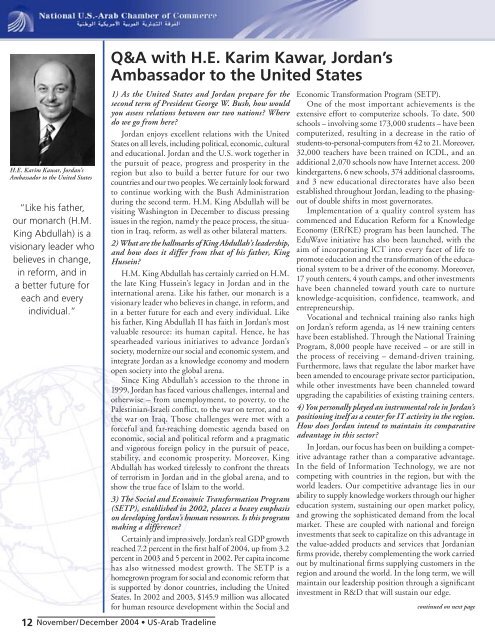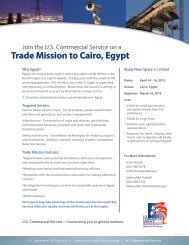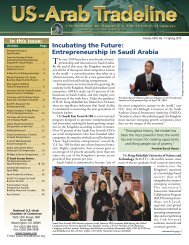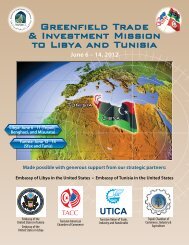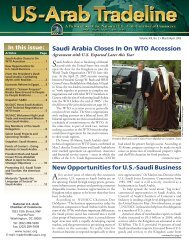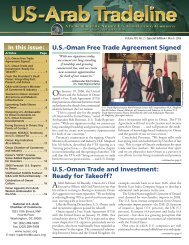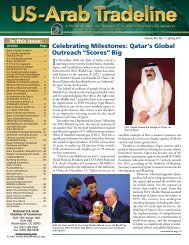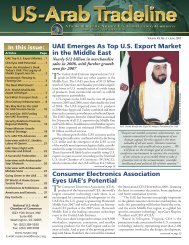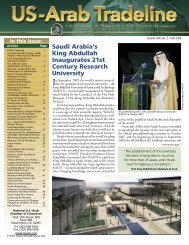Jordan - National US-Arab Chamber of Commerce
Jordan - National US-Arab Chamber of Commerce
Jordan - National US-Arab Chamber of Commerce
Create successful ePaper yourself
Turn your PDF publications into a flip-book with our unique Google optimized e-Paper software.
H.E. Karim Kawar, <strong>Jordan</strong>’sAmbassador to the United States“Like his father,our monarch (H.M.King Abdullah) is avisionary leader whobelieves in change,in reform, and ina better future foreach and everyindividual.”Q&A with H.E. Karim Kawar, <strong>Jordan</strong>’sAmbassador to the United States1) As the United States and <strong>Jordan</strong> prepare for thesecond term <strong>of</strong> President George W. Bush, how wouldyou assess relations between our two nations? Wheredo we go from here?<strong>Jordan</strong> enjoys excellent relations with the UnitedStates on all levels, including political, economic, culturaland educational. <strong>Jordan</strong> and the U.S. work together inthe pursuit <strong>of</strong> peace, progress and prosperity in theregion but also to build a better future for our twocountries and our two peoples. We certainly look forwardto continue working with the Bush Administrationduring the second term. H.M. King Abdullah will bevisiting Washington in December to discuss pressingissues in the region, namely the peace process, the situationin Iraq, reform, as well as other bilateral matters.2) What are the hallmarks <strong>of</strong> King Abdullah’s leadership,and how does it differ from that <strong>of</strong> his father, KingHussein?H.M. King Abdullah has certainly carried on H.M.the late King Hussein’s legacy in <strong>Jordan</strong> and in theinternational arena. Like his father, our monarch is avisionary leader who believes in change, in reform, andin a better future for each and every individual. Likehis father, King Abdullah II has faith in <strong>Jordan</strong>’s mostvaluable resource: its human capital. Hence, he hasspearheaded various initiatives to advance <strong>Jordan</strong>’ssociety, modernize our social and economic system, andintegrate <strong>Jordan</strong> as a knowledge economy and modernopen society into the global arena.Since King Abdullah’s accession to the throne in1999, <strong>Jordan</strong> has faced various challenges, internal andotherwise – from unemployment, to poverty, to thePalestinian-Israeli conflict, to the war on terror, and tothe war on Iraq. Those challenges were met with aforceful and far-reaching domestic agenda based oneconomic, social and political reform and a pragmaticand vigorous foreign policy in the pursuit <strong>of</strong> peace,stability, and economic prosperity. Moreover, KingAbdullah has worked tirelessly to confront the threats<strong>of</strong> terrorism in <strong>Jordan</strong> and in the global arena, and toshow the true face <strong>of</strong> Islam to the world.3) The Social and Economic Transformation Program(SETP), established in 2002, places a heavy emphasison developing <strong>Jordan</strong>’s human resources. Is this programmaking a difference?Certainly and impressively. <strong>Jordan</strong>’s real GDP growthreached 7.2 percent in the first half <strong>of</strong> 2004, up from 3.2percent in 2003 and 5 percent in 2002. Per capita incomehas also witnessed modest growth. The SETP is ahomegrown program for social and economic reform thatis supported by donor countries, including the UnitedStates. In 2002 and 2003, $145.9 million was allocatedfor human resource development within the Social andEconomic Transformation Program (SETP).One <strong>of</strong> the most important achievements is theextensive effort to computerize schools. To date, 500schools – involving some 173,000 students – have beencomputerized, resulting in a decrease in the ratio <strong>of</strong>students-to-personal-computers from 42 to 21. Moreover,32,000 teachers have been trained on ICDL, and anadditional 2,070 schools now have Internet access. 200kindergartens, 6 new schools, 374 additional classrooms,and 3 new educational directorates have also beenestablished throughout <strong>Jordan</strong>, leading to the phasingout<strong>of</strong> double shifts in most governorates.Implementation <strong>of</strong> a quality control system hascommenced and Education Reform for a KnowledgeEconomy (ERfKE) program has been launched. TheEduWave initiative has also been launched, with theaim <strong>of</strong> incorporating ICT into every facet <strong>of</strong> life topromote education and the transformation <strong>of</strong> the educationalsystem to be a driver <strong>of</strong> the economy. Moreover,17 youth centers, 4 youth camps, and other investmentshave been channeled toward youth care to nurtureknowledge-acquisition, confidence, teamwork, andentrepreneurship.Vocational and technical training also ranks highon <strong>Jordan</strong>’s reform agenda, as 14 new training centershave been established. Through the <strong>National</strong> TrainingProgram, 8,000 people have received – or are still inthe process <strong>of</strong> receiving – demand-driven training.Furthermore, laws that regulate the labor market havebeen amended to encourage private sector participation,while other investments have been channeled towardupgrading the capabilities <strong>of</strong> existing training centers.4) You personally played an instrumental role in <strong>Jordan</strong>’spositioning itself as a center for IT activity in the region.How does <strong>Jordan</strong> intend to maintain its comparativeadvantage in this sector?In <strong>Jordan</strong>, our focus has been on building a competitiveadvantage rather than a comparative advantage.In the field <strong>of</strong> Information Technology, we are notcompeting with countries in the region, but with theworld leaders. Our competitive advantage lies in ourability to supply knowledge workers through our highereducation system, sustaining our open market policy,and growing the sophisticated demand from the localmarket. These are coupled with national and foreigninvestments that seek to capitalize on this advantage inthe value-added products and services that <strong>Jordan</strong>ianfirms provide, thereby complementing the work carriedout by multinational firms supplying customers in theregion and around the world. In the long term, we willmaintain our leadership position through a significantinvestment in R&D that will sustain our edge.continued on next page12 November/ December 2004 • <strong>US</strong>-<strong>Arab</strong> Tradeline


